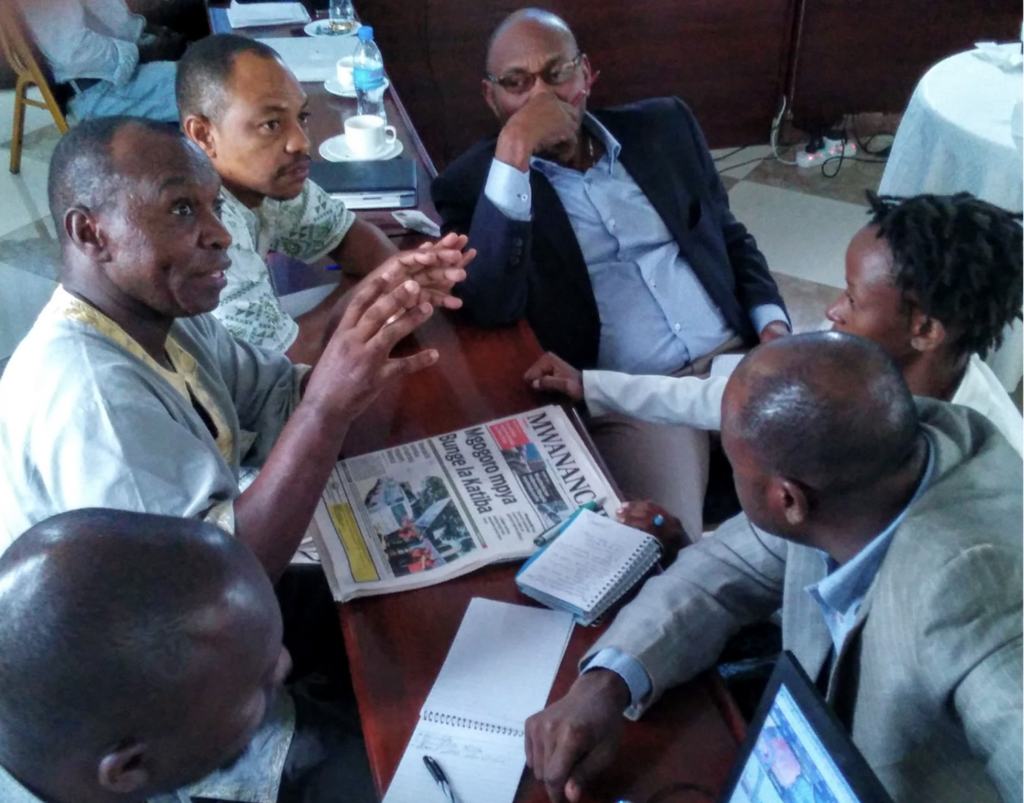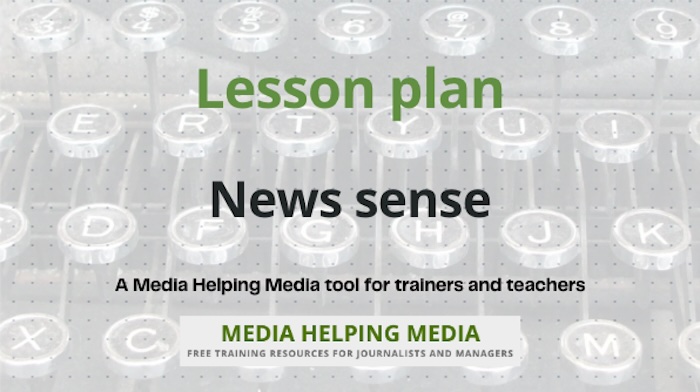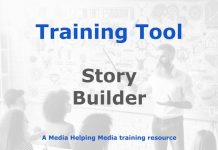
How do we know what is “news”? There are millions of things going on in the world all the time and only some of them become news stories.
A journalist is able to pick out the newsworthy items and turn them into stories that people will want to read and hear and watch. That ability is what we call “news sense”.
It is tricky to define.
It is probably an instinct and our own experience suggests that some people are born with that instinct while others develop it through practice.
We asked a number of experienced journalists to try to explain what news sense is, and how it can be developed. The following is what they said. We have listed the names of the contributors alphabetically.
When you’ve read their definitions, please feel free to suggest your own or offer examples of news sense at work on our Facebook page.
Rahnuma Ahmed, writer, and Shahidul Alam, writer, photojournalist, and social activist, Bangladesh.
“News is information that is of value which was previously unknown. Both criteria need to be met, but the criteria might not apply equally to all. It may well have been known to some and shielded from others, or of great value to some but not of equal value to others.
“The death of an unknown child in a remote village, may have little news value to people far away, but be major news to the community. If it is symptomatic of a major pandemic that could affect millions, that same death might become news for the world. The treatment of that pandemic might have news value to pharmaceutical companies, to health workers, scientists, insurance companies and even undertakers. If none of these applied it would still have immense news value to the child’s mother.”
Jonathan Baker, formerly Head of the BBC College of Journalism and Professor of Journalism at Essex University.
“Old hands will tell you that what makes a story cannot be defined, but that they know one when they see one.
“It’s true that instinct and experience are important elements of news sense. But anyone can make a good news judgement by asking a number of simple questions:
“Is it new? Is it important? Is it interesting or amusing? Who is affected by it? Is there a human element?
“You need to answer all of these questions through the perspective of your readers, listeners or viewers. They should always be foremost in your thoughts. Who are they? Will they want to know about this? Do they need to? Is it relevant to their lives?
“The answers to these questions should help you decide whether or not a story is newsworthy, as well as helping develop an instinctive news sense over time.”
John Bottomley, former chief sub-editor and Head of Sport at Trinity Mirror Cheshire, England.
“News sense is an important component of a reporter’s skills. It is intuition, being able to recognise instantly what will make ‘a good story.’ A good journalist never loses the feeling of satisfaction at spotting one. And if the subject matter lies beyond the reporter’s ‘patch’ he or she will work hard to unearth a local angle to ensure the story isn’t wasted.
“Good news sense may itself inspire investigative journalism but is at its best when homing in on the makings of a one-off good yarn, one which doesn’t always have to a ‘big’ story, a quirky one is often just as good or even better. When ‘shark bite’ was spotted on the list of operations scheduled at the local hospital it was destined to be ‘a good story’ no matter how serious or frivolous the details.*
“Good new sense can involve identifying current news trends and following them locally. If a serious dog attack makes national headlines then any minor one locally can naturally assume a higher profile.
“News sense may often be intuitive but surely it can be taught. In local journalism this can go alongside getting to know the area so that a flip through the latest planning applications may flag up something of interest eg. plans to build homes on a well-known flood plain etc.
“Good news sense can see a good story revisited. The closure of a long established family-run village butcher’s shop can easily lead to follow-up stories: ‘The end of an era,’ ‘Death of the High Street,’ ‘The village that is dying’ (lack of public transport to the nearest butcher?) and may also inspire a website campaign or two. Plus there is the bigger picture. Is the shop’s demise just about economics? What about changing eating habits? Does the closure of a butcher’s reflect the growth of vegetarian values nationally? Is the village now home to any new ‘artisan food’ shops or restaurants? And ultimately, you never know, a build-up to perhaps making the claim it is a contender for ‘greenest village in the UK?’”
* A baby shark at the local aquarium had bitten the arm of the keeper feeding him. He needed a bit of patching up, the event hadn’t really been that dramatic but that didn’t stop the story being front page lead in the local paper.
Justin Burke, publisher of eurasianet, a news and analysis website covering Central Asia and the Caucasus.
“News sense is the value added that experienced journalists give to observations of everyday events. It enables journalists to organise stories in ways that make it easier for readers to make sense of the news and understand why events are unfolding the way they are. It helps writers show how the past is shaping the present, placing current affairs in a broader context. New sense also fosters forward-looking analysis that allows readers to make connections concerning current affairs, identify trends and be more aware of potential outcomes.”
Bob Clifford, formerly of the BBC.
“News sense is a form of involuntary reaction to things going on around you – the ability/gift/curse to be able to spot a potential story in virtually anything you see or hear.
“It’s a bit like when the doctor taps that spot just below your kneecap and your leg jerks up.
“Something happens – you react.
“You pass a man who’s smoking a pipe and it strikes you that it’s now a very rare sight – so phone the Worshipful Company of Tobacco Pipe Makers for a story on how they see their future or lack of it.
“You watch a television personality doing a solemn piece to camera while walking among Commonwealth war graves and notice that, as usual, she has her sunglasses perched on top of her head. Isn’t that rather relaxed and disrespectful? Phone a veterans’ group for an angry reaction.
“The electrician fixing your lights tells you he hasn’t had any Covid jabs because his wife is trying to get pregnant. Are there lots like him? Ask the NHS and others for figures and comment.
“You overhear a fellow bus passenger phoning their dentist to say they are running late. But they don’t say sorry and you realise that this isn’t the first time you have noticed this. Phone social commentators and etiquette experts to help work up a piece for the feature pages on the death of manners..
“A good test:
“You leave home, get to work and the boss says the diary page is short of one last item, time is running out, and have you seen anything that can be turned into a couple of interesting paragraphs?
“If you have kept your eyes really open, and your news sense fully engaged, you should be able to come up with at least something of interest – which, in the end, is what journalism is all about.”
Caroline Faraj, CNN VP, CNN Arabic editor-in-chief
“Many in our industry understand the term but find it hard to explain in words, simply because it is encouraging the young journalists to use their senses.
“I usually tell our young members or interns to use their senses and try to answer some questions, like: Is there a story here? Would our audience be interested in it? Is it relevant to them? Am I focusing on reporting the truth? If yes, do I have the story covered from all sides? Then when you have elements that can be considered worth a story, would I feel proud to add my byline on it? If yes, then I would encourage the young journalist to write it and own it too.”
Phil Harding, broadcaster and formerly Director of News for the BBC World Service.
“It’s what’s new, it’s what is interesting, it’s what is important. It’s what you think will interest your audience or readership but not just what they may already be interested in – or what they tell you they are interested in – it’s sometimes about telling them about something that they become interested in once you have told them about it.”
Vincent Kahiya, former group editor-in-chief Alpha Media Holdings Zimbabwe, including The Standard, NewsDay, and The Independent.
“Reporters must cultivate what’s called a “news sense” as an instinctive feel for what constitutes a big story. For an experienced reporter, the news sense often manifests itself as a voice screaming inside their head whenever a big story breaks. “This is important,” the voice shouts. “You need to move fast.”
“The main building blocks to having news sense are reading newspapers, watching/listening to news bulletins, and having an awareness about the relationship between readers and their environments; that is context.
“Now, you can drill the factors that make something newsworthy into young journalists – impact, loss of life, consequences and so on. But at some point the development of a news sense must go beyond routine learning and be absorbed into a reporter’s body and soul. It must be instinctive, part of a journalist’s very being
“But that won’t happen if a student isn’t excited about the news, because a news sense is really all about the adrenaline rush that anyone who’s ever covered a big story knows so well. It’s the feeling one MUST have if he or she is to be even a good reporter, much less a great one.
“You won’t make it as a reporter if you don’t develop a nose for news, if you don’t hear that voice yelling inside your head. And that won’t happen if you’re not excited about the work itself.”
Ivan Kuzmanovski, senior reporter, Sitel Television, North Macedonia.
“News sense is probably the first thing you will hear when you start working as a reporter. It is something more than following the rules of making the story, but establishing a real connection with the audience. You need to know what the public is interested in and give them the information they need at the right time. It does not matter whether it is a political event, accident, crime story, investigative story, natural disasters, health problems, pandemic, always have the needs of your audience at the forefront of your mind.”
TP Mishra, the Executive Editor of the Bhutan News Service, an all-volunteer-run news agency for Bhutanese refugees.
“As a Bhutanese refugee editing news for my community I always ask myself whether the story is of interest to me. If it is, then an intuitive feeling kicks in to help me explore the angles that are of most importance to those I am writing for.
“In 2004 I was the editor leading a small team that set up a newspaper for the exiled Bhutanese living in refugee camps in Nepal. Our newspaper, The Bhutan Reporter, had a clear purpose, to keep Bhutanese refugees informed about news related to the home they had left in Bhutan, and their new home in the camps.
“So we had well-defined areas of interests that we decided to cover on behalf of our readers. And that purpose helped us tune our news sense to meet that need. We just knew what mattered most to those we were writing for. And we could pass that on to new recruits who joined us.”
 The question of what constitutes “news” is a complex one. In a world saturated with information, only a tiny fraction of events become news stories.
The question of what constitutes “news” is a complex one. In a world saturated with information, only a tiny fraction of events become news stories.
The ability to identify these newsworthy items and craft them into compelling narratives is a skill known as “news sense.”
While often described as an instinct, it’s more accurately a combination of innate aptitude and developed expertise.
Experienced journalists often struggle to define news sense, yet they recognise it instantly. It’s a gut feeling, honed through years of practice, that signals the potential of a story.
This intuition isn’t mystical; it’s grounded in a deep understanding of audience needs, current events, and the mechanics of storytelling.
One crucial aspect of news sense is understanding relevance. A seemingly insignificant event in one context might be hugely impactful in another.
The death of a child in a remote village, for example, might be a local tragedy, but if it reveals a wider public health crisis, its significance expands exponentially.
News sense allows journalists to discern these layers of relevance and understand how a story connects to different audiences. It’s about asking: Who is affected by this? Why should they care?
Another important element is newsworthiness. Is the information new? Is it important? Is it interesting? These questions, while simple, require careful consideration.
“New” doesn’t just mean recent; it can also mean previously unknown or a fresh perspective on a familiar issue.
“Important” can be subjective, but generally refers to events that have a significant impact on people’s lives.
“Interesting” encompasses a range of factors, including human interest, novelty, and emotional resonance.
News sense also involves understanding the broader context of events. It’s not enough to simply report what happened; journalists must also explain why it happened and what it means.
This requires a deep understanding of history, culture, and the forces that shape society. By placing current events in a broader context, journalists help their audiences make sense of the world around them.
Developing news sense is a continuous process. It involves staying informed, observing the world, and constantly asking questions.
Reading widely, watching news, and engaging in discussions about current events are all essential.
It also involves developing empathy and understanding the perspectives of different audiences.
While some individuals may have a natural inclination towards news sense, it can also be learned and refined.
Experience is a valuable teacher, but so is mentorship and guidance from seasoned professionals.
Journalism schools and news organisations play a crucial role in cultivating news sense in aspiring reporters.
Ultimately, news sense is about more than just identifying stories; it’s about understanding their significance and communicating them effectively to an audience.
It’s the ability to connect with people, to inform and engage them, and to help them make sense of the complex world we live in.
It is a crucial skill for any journalist who wants to make a difference.

Questions
- What is “news sense” and why is it important?
- Why is relevance considered a crucial aspect of news sense?
- Define “newsworthiness”
- What role does understanding the broader context of events play in journalism?
- How can journalists develop and refine their news sense?
- Explain how empathy contributes to a journalist’s news sense.
- Discuss the significance of mentorship and guidance in cultivating news sense in aspiring reporters.
- Is news sense an innate aptitude or a developed expertise?
- Analyse the relationship between news sense and audience engagement.
- Evaluate the importance of news sense in making a difference in journalism.
Answers
- News sense is the ability to identify newsworthy items and craft them into compelling narratives. It is described as a combination of innate aptitude and developed expertise.
- Relevance is crucial because it helps journalists discern the significance of events in different contexts and understand how a story connects to various audiences.
- Newsworthiness is defined by whether the information is new, important, or interesting, requiring careful consideration of these factors.
- Understanding the broader context helps journalists explain why events happened and what they mean, aiding audiences in making sense of the world.
- Journalists can develop news sense by staying informed, observing the world, engaging in discussions, and learning from experience and mentorship.
- Empathy allows journalists to understand different audience perspectives, enhancing their ability to connect with and engage their audience.
- Mentorship and guidance from seasoned professionals are crucial in helping aspiring reporters cultivate their news sense.
- News sense is both an innate aptitude and an expertise which developed through practice and understanding in honing this skill.
- News sense is related to audience engagement by enabling journalists to identify and communicate stories that resonate with and inform their audience.
- News sense is important in journalism as it helps journalists identify significant stories and communicate them effectively, making a difference in society.
Lesson plan for trainers
If you are a trainer of journalists we have a free lesson plan: ‘Developing and applying news sense‘ which you are welcome to download and adapt for your own purposes.
Media Helping Media thanks all those who contributed to this piece.









